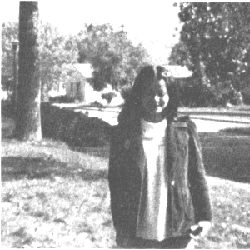|
however, she had the
thought in the back of her mind to move to San Francisco. She didn't know what
it was about that city that attracted her, but she couldn't put down the idea.
In 1972 she and her sister moved to Louisville, Kentucky, where another of their
brothers lived, and attended Spalding College, where Kuo Hui majored in Fine
Arts. By this time her younger sister had heard of Gold Mountain Monastery in
San Francisco and the wish to go to that city became firmly implanted in her
mind as well.
By 1975 their dream became a reality and
they traveled to San Francisco. Kuo Hui was temporarily satisfied just to be in
the city and began to make plans to attend art school, but her younger sister
was still not at the end of her search. Mustering up her courage, she walked
halfway across the city (not knowing how to go by bus) to Gold Mountain
Monastery. But once there, she couldn't bring herself to go in and walked back
home again. Several more times she would make her way to the Monastery, only to
draw back at the last minute and not dare to go in and join the assembly.
Finally Kuo Hui decided to accompany her younger sister there, hoping to lend
her the courage she needed to make her way inside. The two sisters joined the
Avatamsaka assembly for a lecture given by the Venerable Master during the
1975-76 winter Ch’an session. Although Kuo Hui's original intention had been
that of merely companionship for her sister, she found herself drawn to the
Dharma she was hearing and felt deep affinities with the Venerable Master. She
continued to accompany her sister to hear more of the Wonderful Dharma, and soon
they both moved to the convent, where, as laywomen, they acted as Dharma
protectors while they followed along with the assembly in the study and practice
of the Dharma.
Kuo Hui, whose Dharma name means
"Fruit of Benevolence," works untiringly for the spread of the Dharma
and always appears to enjoy what she is doing, no matter how "bitter"
the job. She quickly adopted the ascetic practices of eating only one meal a day
and never lying down to sleep. Kuo Hui is blessed with a spontaneously sincere
regard for all beings, and seems to possess an endless store of selfless energy
with which to personally put the orthodox Dharma into practice.
--------------------------
SUTRA
OF THE PAST VOWS OF EARTH STORE BODHISATTVA. The classic Buddhist description of
the workings of karma, and of the extraordinary filial piety of one of the great
Buddhist heroes. With commentary by the Venerable Ch'an Master Hsuan Hua, Abbot
of Gold Mountain Monastery in San Francisco. A book widely known in China, now
in English for the first time. 235 pages, 6 x9, $6.75 paper.
RECORDS
OF THE LIFE OF CH'AN MASTER HUA, Vol. II. The Master's years in Hong Kong in the
1950's, building monasteries, caring for refugee monks and nuns, teaching people
and transforming them. A remarkable account of the active life of a sage.
Photographs. Paperbound, 230 pages, 5 1/2 x 8 1/2, $6.95.
|
